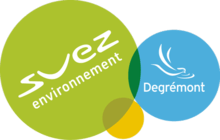Anderson Water Systems
 | |
| Industry | Water treatment |
|---|---|
| Founded | 1952 |
| Founder |
Bill Anderson, Earl Gallagher |
| Headquarters | Ancaster, Ontario, Canada |
Area served | Worldwide |
| Products | |
| Services |
Commissioning, Maintenance, Media, Retrofits, Site audit, Parts (Replace/Custom) |
| Parent | SUEZ |
| Website | awsl.com |
Anderson Water Systems, Inc. (now SUEZ Treatment Solutions Canada L.P.) is a Canadian manufacturer and service provider of industrial water systems located in Ancaster, Ontario.[1] Established in 1952 Anderson specializes in ion exchange and provides custom solutions for reverse osmosis, EDI, degasification, clarification, filtration (nano / ultra) for a variety of applications and industries with more than 3000 installations in over 40 countries.[2]
Having been acquired by Degrémont in 2000, Anderson operates under the brand name SUEZ Treatment Solutions.
History
Three partners created the J.W. Anderson Company in Dundas, Ontario in 1952 to serve domestic demand for water softening equipment. In 1965, Anderson expanded into the industrial water treatment market. Installations through the 1960s and 70's were used by various industries such as food & beverage, pulp & paper, chemical, power generation and pharmaceutical. From this experience in 1974 Anderson became the first Canadian distributor for DuPont membranes. In the early 1980s Anderson pioneered the split-flow counter-current ion exchange process while expanding into the United States market. Five officers of the J.W. Anderson Company bought it out in 1985, forming Anderson Water Systems Limited[2] which saw continued growth driven by projects in oil and petrochemical.
During the early 1990s, Anderson secured major contracts in Southeast Asia, supplying systems to Indonesia, Singapore, China and Thailand. From 1995 onward Anderson continued to expand its presence internationally with installations in South America, Australia, Russia and the Middle East. Degrémont acquired Anderson on May 10, 2000; making it a subsidiary of Suez Environnement the parent company of the Degrémont water treatment company.[2]
In February 2013, Anderson consolidated four production and office locations into a new facility in Ancaster, Ontario.[2] Anderson remains active with projects in the Americas, Middle East, Asia and Africa.
Major projects
- 1977: Anderson builds the first large reverse osmosis in Canada, a 450 GPM system for SaskPower in Saskatchewan.
- 1978: First significant contract in Asia with the Korea Electric Power Corporation.
- 1983: Supplied BP Resources with ion exchange equipment, for one of the earliest commercial SAGD systems in the Alberta oil sands.
- 1995: Design–build highly customized two tiered 24-foot (7.3 m) tall super skid for Kodak with on the fly acid neutralization.
- 2002: Began multi-phase oil sands SAGD expansion for Cenovus Energy (formerly Encana) and ConocoPhillips in Alberta.
- 2007: Installed system for a supercritical coal power boiler in North America.
- 2013: Multi-phase deionization system for a chemical plant in Africa.
Products
Each product is customized to suit the applications and specifications of the customer.
Brine Ion Exchange Systems: Remove impurities (such as calcium, magnesium, strontium and barium) and maintain brine quality in the Chlor Alkali Cycle. Modular designs and custom skids have flow rates of 50 to 2000 m3/h.
Chemical Injection Skids: Provide reagents into system to maintain standard operation conditions in a treatment cycle.
Chemical Regeneration Skids: Regenerate ion exchange resins effectively and efficiently to maintain operations.
Condensate Polisher Systems: Economically maintains quality of water by removing impurities from return Condensate and protects other systems from deposit formation.
Decarbonators: Removes CO2 from feed water.
Electro-Deionisation (EDI) Systems: Primarily used for RO permeate polishing and is widely used as a final polisher replacing traditional ion exchange units which required chemical regeneration. It also has a high rejection of soluble ionic load.
Industrial Control Systems (ICS): Programmable Logic Controllers (PLC) are integrated into every system to facilitate automatic system operation and maintenance, along with a Human-Machine Interface (HMI) or Supervisory Control and Data Acquisition (SCADA) for operator ease of use and remote monitoring.
Media Pressure Skids: Utilize specific materials to remove certain constituents from water, such as iron, manganese, free chlorine, organic matter and suspended solids. This maximizes the ion exchange and/or membrane performance that follow in the system.
Nanofiltration: Mainly utilized for producing softened water for industry or potable water from a brackish source. This semi permeable membrane can operate at reduced operating pressures as compared to reverse osmosis.
Reverse Osmosis (RO): Traditionally used for reducing total dissolved solids in water from sea water or brackish water sources. Now more applications have developed for heavy industry and power generating who require high quality water. Membrane developments have improved filtration at reduced operating pressures which has resulted in RO becoming an economical technology for soluble ion removal.
Steam-Assisted Gravity Drainage (SAGD): Used in the oil sands SAGD brings together many products to provide easier, low-impact oil extraction with flows ranging from 50 to 5,000 m3/h (220 gpm to 22,000 gpm).[3]
Ultrafiltration Skids: Produces very low turbidity water used in industry, with membranes that have a pore size of 0.01 µm which can economically remove colloidal matter that would normally foul a microfiltration system.
Vacuum Degassers: Used to remove oxygen, carbon-dioxide and nitrogen from water down to part-per-billion levels. This is part of the final polishing stage to produce ultra high purity water.
Services
Anderson provides a range of services for industrial water systems.
Commissioning: Startup, troubleshoot, optimize and validate output of a new installation.
Media: Supply all types of filtration media, from simple gravel to resin of any specification.
Maintenance: Provide routine maintenance to remove buildup or take preventative measures to ensure uptime.
Parts: Source replacement parts or design-build customized items for any water system.
Retrofits: Create customized upgrades and add-ons to augment system capacity while maintaining operations.
Site audit: Inspect an existing system and provide recommendations to improve output quality, reliability, or meet current regulatory requirements.
References
External links
- Anderson Water Systems - company website